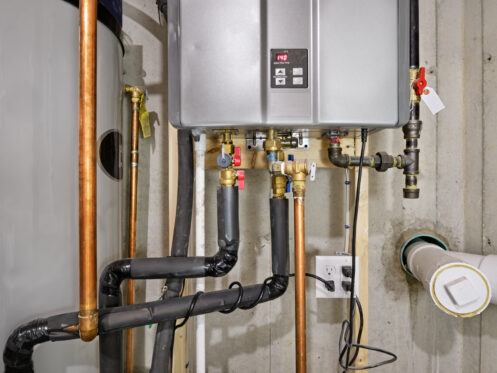Choosing the right water heater for your home could make all the difference when it comes to bathing, washing laundry, cleaning dishes, and other household tasks. You need a water heater that will provide hot water as often as you and your family need it. Your water heater should fit your budget and help with your utility bills to keep you on track with your budget. Let’s look at some comparisons between the traditional tank-style water heaters and tankless water heaters. These points will give you starting information on choosing a water heater.
How Each Type Works
While the result is the same, tankless and tanked water heaters work completely differently. It’s a good idea to know how each type of system operates when choosing one for your home.
Tank Water Heater Operation
A tank-style water heater contains a holding tank, or reservoir, that stores hot water until the water is needed. The tank fills with water and keeps the water heated until it is drawn from the faucet. With this method, the water heater is constantly running to keep the water at the desired temperature. This reservoir ranges in size depending on the model you choose. You may opt for a larger tank if you have a large family.
Tankless Water Heater Operation
Tankless water heaters have no reservoir. The water runs across the heating elements to be heated right before moving to the faucet. With this type of water heater, the water heats up on demand and only when needed.
Hot Water Demand
Every home and every family differ in their hot water needs. You may have a large family with a high demand for hot water such as showers, laundry, and dishes. You may have a small family that uses very little hot water on a typical day. The needs of your household are the most crucial factor when determining what water heater to purchase. Choosing the wrong model can mean cold showers and lengthy waits to do other chores.
Hot Water Capacity for Tank Water Heaters
You have many options for tank size when choosing a tank-style water heater. You can find these water heaters with a holding tank as small as 30 gallons or as large as 80 gallons. If you live alone, you may get by with a small 30-gallon water heater. For larger families, you’ll need an 80-gallon water heater to even have a chance at keeping up with the demand for hot water in your home. Just remember that with tank-style water heaters, once the water held in the tank is gone, you’ll be waiting for the tank to refill before you have hot water coming out of your faucets again.
Hot Water Capacity for Tankless Water Heaters
Tankless water heaters don’t limit the amount of hot water you have access to. Water is moved along heating elements as needed, meaning you have an endless supply of hot water for your home. If you have a large family, a tankless water heater is probably your best option to keep up with the demands of multiple showers, several loads of laundry, and many dirty dishes every day. Imagine your family all taking showers in the morning without a single complaint of cold water!
New Water Heater Costs
Purchasing a new water heater comes with a price tag. You’ll need to consider the actual cost of the water heater you choose plus the cost of installation when considering how much your water heater will ultimately cost you. The price of a tankless water heater is significantly higher than that of a tank water heater. However, cost should not be the sole determining factor when choosing which water heater is right for your home. You might find that the tankless water heaters cost more to buy and install but offer other benefits that make it a better option overall.
Water Heater Energy Efficiency
Energy efficiency is one of the most important factors when choosing a water heater. You’ll want to choose a water heater that doesn’t drain electricity or gas and keeps your utility costs within your budget.
Energy Efficiency of Tank Water Heaters
Tank-style water heaters hold heated water in a reservoir until a hot water faucet is turned on. This requires the water heater to run nearly constantly to keep the water at the desired temperature. With this style of water heater, you may see higher operational costs.
Energy Efficiency of Tankless Water Heaters
A tankless water heater only heats water as it is drawn from the tap. This means that you’ll only use energy when hot water is needed. Between uses, hot water doesn’t need to be heated as it does with a tank-style water heater. In terms of energy efficiency, a tankless water heater is your best bet.
Water Heater Maintenance Costs
As with any large appliance or piece of equipment, you will occasionally require maintenance for your water heater. The maintenance of tank water heaters and tankless models differs a great deal, though, and could be a big part of your decision-making process.
Maintenance Costs of Tank Water Heaters
All types of water heaters require regular maintenance. Because you have water sitting in a tank at all times, your tank-style water heaters should be drained and flushed to remove sediment that builds up.
Maintenance Costs of Tankless Water Heaters
Tankless water heaters consist of heating elements and do not feature a holding tank. Due to the simple design, routine maintenance consists only of occasional inspection of parts and connections.
Size and Space
Tank water heaters and tankless models vary greatly in terms of size and the space they occupy. For smaller homes, this may be a huge determining factor when choosing the best water heater.
Size and Space Requirements for a Tank Water Heater
Tank water heaters have a tank that holds the water. These range in size but typically hold 30 to 80 gallons of hot water. For this style, you’ll need a considerable amount of space to install the water heater. You will usually find a tank water heater in a storage closet or the basement near the furnace.
Size and Space Requirements for a Tankless Water Heater
A tankless water heater is simply a panel with heating elements. There is no tank, so the slim design fits nearly anywhere in the house. Tankless water heaters are installed on the wall and take up very little space.
Now that you have some initial information on the differences between tank and tankless water heaters, you should have a good start to deciding on which type to purchase. When considering which style is best for your home, consider things such as your current budget for upfront costs, your family’s hot water needs, and the amount you have to spend on utility and maintenance costs down the road.
Are you ready to decide and get your new water heater installed? Call Specialty Heating & Cooling LLC today and meet with a trusted professional who will guide you through the process, from choosing the best model to the final installation.


